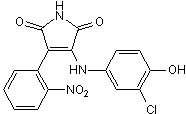SB 415286
Chemical Name: 3-[(3-Chloro-4-hydroxyphenyl)amino]-4-(2-nitrophenyl)-1H-pyrrole-2,5-dione
Purity: ≥99%
Biological Activity
SB 415286 is a potent and selective glycogen synthase kinase-3 (GSK-3) inhibitor (Ki = 31 nM for GSK-3α); competes with ATP. Has minimal activity against 24 other protein kinases (IC50 > 10 μ M). Stimulates glycogen synthesis, gene transcription and is neuroprotective.Technical Data
The technical data provided above is for guidance only.
For batch specific data refer to the Certificate of Analysis.
Tocris products are intended for laboratory research use only, unless stated otherwise.
Additional Information
Background References
-
Selective small-molecule inhibitors of glycogen synthase kinase-3 activity protect primary neurones from death.
Cross et al.
J.Neurochem., 2001;77:94 -
Selective small molecule inhibitors of glycogen synthase kinase-3 modulate glycogen metabolism and gene transcription.
Coghlan et al.
Chem.Biol., 2000;7:793 -
Regulation and function of glycogen synthase kinase-3 isoforms in neuronal survival.
Liang and Chuang
J.Biol.Chem., 2006;282:3904
Product Datasheets
Reconstitution Calculator
Molarity Calculator
Citations for SB 415286
The citations listed below are publications that use Tocris products. Selected citations for SB 415286 include:
27 Citations: Showing 1 - 10
-
mTOR-dependent phosphorylation controls TFEB nuclear export.
Authors: Napolitano Et al.
Nat Commun 2018;9:3312
-
Pyrrolidine dithiocarbamate activates the Nrf2 pathway in astrocytes.
Authors: Liddell Et al.
J Neuroinflammation 2016;13:49
-
Pharmacologically blocking p53-dependent apoptosis protects intestinal stem cells and mice from radiation.
Authors: Wang Et al.
Sci Rep 2015;5:8566
-
Resveratrol regulates naïve CD 8+ T-cell proliferation by upregulating IFN-γ-induced tryptophanyl-tRNA synthetase expression.
Authors: Noh Et al.
BMB Rep 2015;48:283
-
GSK3-mediated raptor phosphorylation supports amino-acid-dependent mTORC1-directed signalling.
Authors: Stretton Et al.
J Biol Chem 2015;470:207
-
Tau reduction prevents Aβ-induced axonal transport deficits by blocking activation of GSK3β.
Authors: Vossel Et al.
Biochem J 2015;209:419
-
GSK3β Inhibition Promotes Synaptogenesis in Drosophila and Mammalian Neurons.
Authors: Cuesto Et al.
PLoS One 2015;10:e0118475
-
Sequential dosing in chemosensitization: targeting the PI3K/Akt/mTOR pathway in neuroblastoma.
Authors: Westhoff Et al.
PLoS One 2014;8:e83128
-
Phosphorylation of amyloid precursor protein at threonine 668 is essential for its copper-responsive trafficking in SH-SY5Y neuroblastoma cells.
Authors: Acevedo Et al.
Hum Mol Genet 2014;289:11007
-
Inhibiting glycogen synthase kinase-3 mitigates the hematopoietic acute radiation syndrome in mice.
Authors: Lee Et al.
Radiat Res 2014;181:445
-
Tristetraprolin mediates radiation-induced TNF-α production in lung macrophages.
Authors: Ray Et al.
PLoS One 2013;8:e57290
-
Anti-dengue virus nonstructural protein 1 antibodies cause NO-mediated endothelial cell apoptosis via ceramide-regulated glycogen synthase kinase-3β and NF-κB activation.
Authors: Chen Et al.
J Immunol 2013;191:1744
-
Sidestream smoke exposure increases the susceptibility of airway epithelia to adenoviral infection.
Authors: Sharma Et al.
PLoS One 2012;7:e49930
-
Glycogen synthase kinase 3β inhibitors protect hippocampal neurons from radiation-induced apoptosis by regulating MDM2-p53 pathway.
Authors: Thotala Et al.
Cell Death Differ 2012;19:387
-
Glycogen synthase kinase 3β inhibition enhances repair of DNA double-strand breaks in irradiated hippocampal neurons.
Authors: Yang Et al.
Nature 2011;13:459
-
GSK-3β inhibition promotes cell death, apoptosis, and in vivo tumor growth delay in neuroblastoma Neuro-2A cell line.
Authors: Dickey Et al.
J Neurooncol 2011;104:145
-
A new class of molecular targeted radioprotectors: GSK-3beta inhibitors.
Authors: Thotala Et al.
Int J Radiat Oncol Biol Phys 2010;76:557
-
Molecular imaging of glycogen synthase kinase-3beta and casein kinase-1alpha kinases.
Authors: Nyati Et al.
Anal Biochem 2010;405:246
-
Glycogen Synthase Kinase 3 (GSK-3) influences epithelial barrier function by regulating occludin, claudin-1 and E-cadherin expression.
Authors: Severson Et al.
Neuro Oncol 2010;397:592
-
The mood stabilizers valproic acid and Li enhance mesenchymal stem cell migration via distinct mechanisms.
Authors: Tsai Et al.
Neuropsychopharmacology 2010;35:2225
-
Phosphorylation of CLASP2 by GSK-3beta regulates its interaction with IQGAP1, EB1 and microtubules.
Authors: Watanabe Et al.
J Cell Sci 2009;122:2969
-
Microtubule stabilization specifies initial neuronal polarization.
Authors: Witte Et al.
J Cell Biol 2008;180:619
-
Cdc42 regulates cofilin during the establishment of neuronal polarity.
Authors: Garvalov Et al.
J Neurosci 2007;27:13117
-
Phosphatidylinositol 3-kinase regulation of gastrin-releasing peptide-induced cell cycle progression in neuroblastoma cells.
Authors: Ishola Et al.
Biochem Biophys Res Commun 2007;1770:927
-
Identification of an N-terminal glycogen synthase kinase 3 phosphorylation site which regulates the functional localization of polycystin-2 in vivo and in vitro.
Authors: Streets Et al.
Biochim Biophys Acta 2006;15:1465
-
Neuronal polarity is regulated by glycogen synthase kinase-3 (GSK-3beta) independently of Akt/PKB serine phosphorylation.
Authors: Gärtner Et al.
J Cell Sci 2006;119:3927
-
Opioid-induced cardioprotection occurs via glycogen synthase kinase beta inhibition during reperfusion in intact rat hearts.
Authors: Gross Et al.
Circ Res 2004;94:960
FAQs
No product specific FAQs exist for this product, however you may
View all Small Molecule FAQsReviews for SB 415286
There are currently no reviews for this product. Be the first to review SB 415286 and earn rewards!
Have you used SB 415286?
Submit a review and receive an Amazon gift card.
$25/€18/£15/$25CAN/¥75 Yuan/¥2500 Yen for a review with an image
$10/€7/£6/$10 CAD/¥70 Yuan/¥1110 Yen for a review without an image

